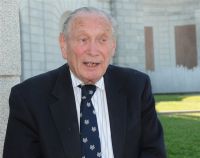WASHINGTON — If it weren’t for America, John Gunther Dean very well might not be alive today.
Born John Gunther Dienstfertig in Breslau, Germany, in February 1926, Dean had a good life to look forward to until the Nazi government started annexing surrounding nations by force — persecuting, enslaving and murdering Jews along the way.
“This country was great to me,” he said. “I came as an immigrant, I was able to go to Harvard, I was fleeing Nazis. … I want to help the country.”
Dean’s family was one of the lucky ones; they escaped to the United States in the winter of 1938–39 and changed their surname. Dean was a quick study in Kansas City, Mo., where his family finally settled, and went off to study at Harvard at the age of 16. In 1944, he became a U.S. citizen and interrupted his education to join the Army.
“Every human being, regardless of age, has to decide at one point what they want to do with their life,” Dean said. “I wanted to serve a cause bigger than myself. Serving the country was a wonderful way of fulfilling that need.”
He originally was sent to Fort Belvoir, Va., to train as a combat engineer. But Dean — a native German speaker who also is fluent in English, French and Dutch — was a perfect fit to work in the Office of Military Intelligence at the infamous P.O. Box 1142, a facility housing teams that interviewed prisoners of war and made clandestine attempts to communicate with Allied prisoners held overseas.
After serving his enlistment, Dean returned to Harvard, where he finished his undergraduate studies in 1947. He studied law at the Sorbonne and got a degree in international relations from Harvard in 1950.
He would end up spending the next 39 years in the U.S. Foreign Service, eventually serving as the U.S. ambassador to Cambodia, Denmark, Lebanon, Thailand and India. But his time working with the military wasn’t over. He routinely worked side by side with top brass. In Vietnam, he oversaw a large contingent of U.S. diplomats as the war came to an end.
“I worked a great deal with the military from 1970 to 1972, in Da Nang, … I was given the equivalent rank of major general,” he said. “I had several hundred American advisors working for me in Vietnam. Unfortunately, 14 of them were killed.”
His unwavering dedication to telling the absolute truth in his diplomatic work often was unpopular, he said, but that didn’t keep him from speaking his mind to superior officers, secretaries of state and U.S. presidents.
“It wasn’t always much appreciated,” he said, noting that his honesty as a diplomat caused quite a few personal conflicts in addition to accolades.
He said his goal in his diplomatic career, fueled partly by his own life, has been to promote development around the world, irrespective of religious influence or culture, so long as the people represent good values and respect.
“I’ve tried to be the best possible representative for the good values the United States stands for, whether it was in military or civilian life,” he said. “We all come to this country, whether we’re Muslims, Christians, Jews, Hindus or Buddhists, we couldn’t care less – we care about our country, and it’s a wonderful country.
“I’m here today to help the country with the problems it has in 2010,” he added. “We’re all humans. We all make mistakes, and so I’m trying to help people learn to do things better.”
(“Veterans’ Reflections” is a collection of stories of men and women who served their country in World War II, the Korean War, the Vietnam War, operations Desert Shield and Desert Storm, and the present-day conflicts. They will be posted throughout November in honor of Veterans Day.)
Source:
U.S. Department of Defense
Office of the Assistant Secretary of Defense (Public Affairs)

 von
von 